| Reviews & Columns |
|
Reviews DVD TV on DVD Blu-ray 4K UHD International DVDs In Theaters Reviews by Studio Video Games Features Collector Series DVDs Easter Egg Database Interviews DVD Talk Radio Feature Articles Columns Anime Talk DVD Savant Horror DVDs The M.O.D. Squad Art House HD Talk Silent DVD
|
DVD Talk Forum |
|
|
| Resources |
|
DVD Price Search Customer Service #'s RCE Info Links |
|
Columns
|
|
|
Jean Harlow Collection
Jean Harlow, platinum blonde goddess of the silver screen, must have been exactly the kind of movie star that the early '30s needed.
She was earthy and sexy, just a little bit naughty but also possessing a sense of humor and a need for acceptance that most everyone can identify with - then and now. It must have been exciting in 1933 to see her in her most iconic role - as Kitty Packard in the star-filled classic comedy Dinner at Eight, nouveau riche wife of Wallace Beery's bullish tycoon. Playing a good time gal who desperately wanted to be part of high society, she was sexy, radiant, and even somewhat touching in her yearning for the good life. For an actress who had been playing stiff "hussy" parts only a few years earlier, this particular film must have been a revelation. Knowing a star when it had one, Metro-Goldwyn-Mayer used all its resources to groom her into one of the most bankable actresses of the time. A few short years later, she was gone.
For a star of Harlow's stature, the current availability of her work has been spotty at best. A few of her best-known films such, as Dinner at Eight, are still widely circulated and as entertaining as ever. Most of the stuff out there now has Harlow as part of ensemble casts with the glittery likes of Clark Gable, however. Aside from her saucy turn in 1932's Red-Headed Woman (available on the Forbidden Hollywood, Vol. 1 set) and a few other minor films, in terms of true star vehicles her filmography has been strangely lacking in the DVD/Blu-ray era.
Warner Archive's made-to-order Jean Harlow 100th Anniversary Collection DVD box fills in that gap with seven new-to-disc films originally released from 1933 up to the year of her tragically early death in 1937. The set shows off Harlow's warmth, humor, and versatility in a variety of roles that reflect MGM's often ill-advised attempts to update or modify the lady's image. The movies in this set pair off Harlow with some of the biggest leading men of that time - Clark Gable, Spencer Tracy, Cary Grant, William Powell, Robert Taylor and Franchot Tone (four times!). Still, these are leading lady vehicles through and through. For Harlow fans, it's a treat.
The films included in this collection are:
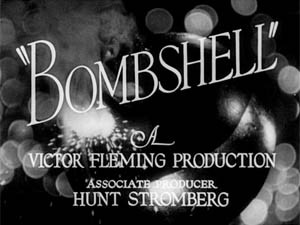
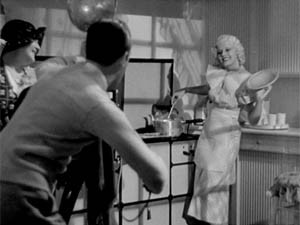
The lightning-paced and hysterically funny Bombshell (1933) has Harlow as beleaguered movie star Lola Burns in one of the best Hollywood send-ups ever. This film has Harlow in her prime, Pre-Code element facing off against Lee Tracy as an unscrupulous publicist who keeps putting her in compromising positions. He is stuck on her, of course, so you know where that is heading by the final reel. Harlow is amazing, especially in the scene where she tells off her chiseling relatives, played by Frank Morgan and a stooge-less Ted Healy. I was also wowed by the underrated Tracy, who often played these kind of fast-talking dudes. The crack supporting cast includes frequent co-star Franchot Tone, Pat O'Brien, Una Merkel, and Louise Beavers (as the maid). Victor Fleming directs with tight assurance. Part of the film's knowing in-jokiness has Harlow's Lola being called to the set for retakes on - what else? - Red Dust, the hit movie that Fleming previously directed Harlow in.
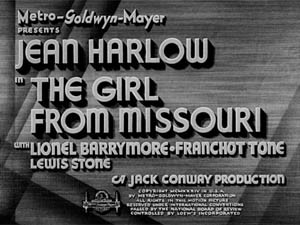
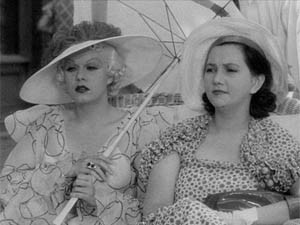
The Girl from Missouri (1934) continues in the same spicy vein with Harlow as Eadie Chapman, an ambitious showgirl with one thing on her mind - snagging a rich husband! With her man-hungry pal Patsy Kelly at her side, the ladies journey to New York City to do just that. Harlow manages to sweet talk her way into the office of wealthy Lewis Stone. The man kills himself, however, and the two must take refuge in sunny Palm Beach, Florida. The two are seeking the protection of industrialist Lionel Barrymore, but they only get as far as his devil-may-care son (Franchot Tone), who is instantly dazzled by the sassy blonde. This starts off as a breezy comedy, then detours into heavy dramatics. Harlow is surprisingly adept at both (check her tearful goodbye to her mom), and she's delightful when paired with the sardonic Kelly. The Girl from Missouri was the first Harlow vehicle released after the Production Code took effect, but the film still retains a sassy pre-Code feel.
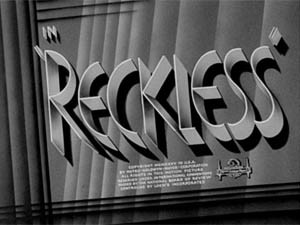
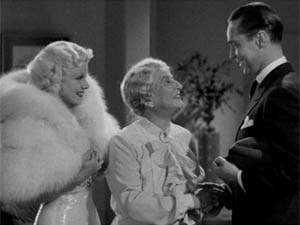
Torrid backstage drama Reckless (1935) was the first of several attempts MGM made at molding Harlow into a more traditional leading lady type, this time at the hands of Dinner at Eight producer David O. Selznick and director Victor Fleming. Once again, she plays an entertainer attempting to salvage a tainted image, but this time things get hot and heavy with Harlow's Mona Leslie being pursued with equal passion by her agent (William Powell) and a wealthy suitor (Franchot Tone, again). The campy highlight in this glossy misfire comes when Harlow sings (dubbed) and dances her way through the luxe title number as 1. cheery co-ed, 2. cruise ship darling, and finally 3. Spanish señorita. The film itself is a weird, overproduced curio, but it does have a few positives going for it. Harlow and Powell have a breezy rapport (despite not having many scenes together), and wonderful May Robson is on hand as Powell's salty ma. Tone admirably tries to break out of his usual goofy child-of-privelege image here, but he's more annoying than good.
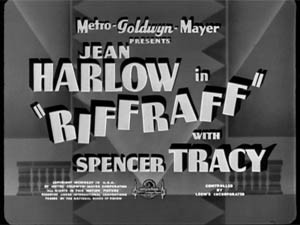
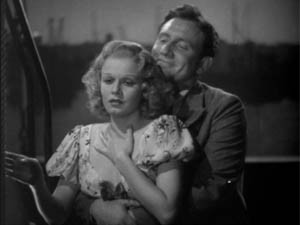
Another year, and another image change came along with Harlow as a cannery worker in Riffraff (1936). For this film, her platinum hair was toned down to a shade that MGM publicity termed "brownette" (this was a big deal in '36, apparently). She was paired with earthy Spencer Tracy as a rabble-rousing, union leading fisherman named Dutch who spars with and ultimately captures the heart of Harlow's Hattie. The other players include Joseph Calleia as the snaky owner of the cannery where Harlow works, Una Merkel as Harlow's sister, and a scrappy young Mickey Rooney as Merkel's son. Fun stuff, with plenty of snappy dialogue co-written by Anita Loos (Harlow to Calliea, after he made a pass at her: "I'll stick to the fishes, they ain't got hands.").
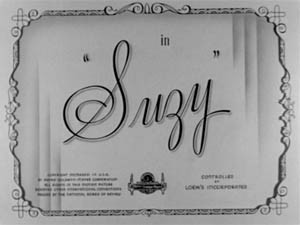
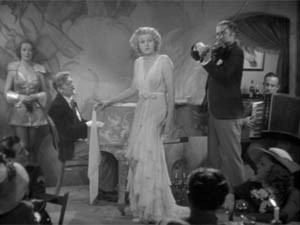
Things get more problematic in Suzy (1936), with the contemporary Harlow oddly cast as a World War I era chanteuse living in London who falls in with Franchot Tone's energetic Irish inventor. The two fall in love and eventually marry, but things go awry when Tone gets mixed up with the German spies who own the aircraft factory where he works. He takes a bullet, and Harlow flees to Paris where she meets and becomes involved with a daredevil French pilot played by dashing, young Cary Grant. Harlow is as appealing as ever, sweetly pert and less overtly sexy than in her Pre-Code days, but the role itself is generic. One could picture Myrna Loy, Joan Crawford or about a dozen other actresses playing it. The film plods along, awash in a convoluted script and all sorts of period anachronisms. Grant's one charming moment has him speak-singing the torch song that Harlow previously performed.
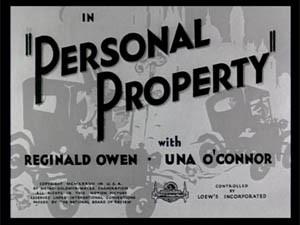
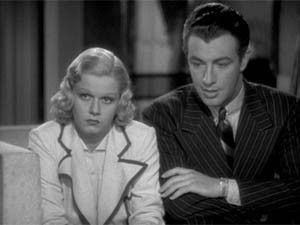
Personal Property (1937), the last film released during Harlow's lifetime, is another of MGM's attempts to fit a square peg into a round hole. In this fluffy comedy based on a stage hit, Harlow plays Crystal Wetherby, a glamorous yet impoverished widow whose fortunes turn when she agrees to have British ex-con Robert Taylor pose as her own butler. She's already engaged to underwear tycoon Reginald Owen, but everything is up for grabs once the rakish Taylor lays on the charm. The MGM gloss is here in spades, and radiant Harlow is nicely matched with a relaxed Taylor. The script is awfully contrived and stagy, however, and director W. S. Van Dyke's agonizingly slow pacing would tax even the most ardent Harlow fans.
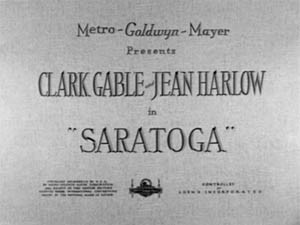
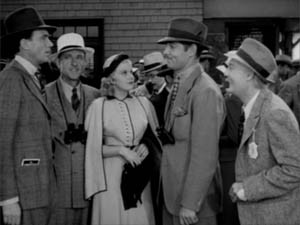
Harlow was working on Saratoga (1937) when she passed away at the age of 26. After she died, MGM patched together this horse racing comedy with co-stars Clark Gable and Walter Pidgeon acting opposite her stand-in, face obscured with large hats and binoculars. Even without its torturous production, the mediocre, by-the-numbers script lets it down. There is one cutely performed scene, with Harlow attempting to cover Gable's presence in her apartment with visiting fiancée Pidgeon by puffing on Gable's cigar. The whole film has a plodding, dispiriting air, as if the entire cast and crew slowed things down to accommodate the already ill Harlow. Saratoga wound up being one of the biggest hits in Harlow's career despite all that, outgrossing every film released in 1937 except Disney's Snow White and the Seven Dwarfs.
The DVD:
Warner Archive has packaged their Jean Harlow 100th Anniversary Collection in a bulky if beautiful slip-covered package, with each film getting its own case. This is as close to a normal retail package as Warner Archive has ever gotten, with chapter stops on scene breaks (not every 10 minutes like on normal m.o.d. titles) and custom designed DVD labels. With this one, there's even an envelope containing 5"x7" postcards of Miss Harlow in various glamour shots - a classy extra for a classy gal.
Audio:
The mono sound is cleanly done and serviceable enough for films of this vintage. Warner Archive trumpets that Bombshell, The Girl from Missouri and Reckless have been remastered, but I'm not sure if that remastering applies to the soundtrack as well.
Video:
Picture quality varies quite a bit on this set, with most films having a fair amount of surface scratching, graininess and blemishes. Riffraff boasts the cleanest transfer; the blurry Saratoga fares the worst. The restored pictures on The Girl from Missouri and Reckless both look decent to good, while the Bombshell picture appears roughed-up.
Extras:
Warner Archive is starting to include intriguing audio bonuses on their discs, and this set is no exception. Reckless includes four pre-recording sessions showcasing Nina Mae McKinney (who appears very briefly in the film) and the ultimately discarded singing voice of Harlow (who appears to be attempting a Marlene Dietrich style, badly). Personal Property's disc contains a vintage "Lux Radio Theater" program with Harlow and Robert Taylor performing the lost Gloria Swanson silent Madame Sans-Gene (Why not their own film? Only Leo the Lion knows.). Vintage Leo is On the Air radio promos are included with Reckless and Suzy. Original trailers, some with Spanish text, for all but one film (Personal Property) round out the extras.
Final Thoughts:
The Jean Harlow 100th Anniversary Collection is a great showcase for classic cinema's quintessential blonde bombshell. Even in her most ill-conceived vehicles (of which a few reside in this box), she remains the radiant embodiment of the sexy gal that everyone can relate to. Recommended.
Matt Hinrichs is a designer, artist, film critic and jack-of-all-trades in Phoenix, Arizona. Since 2000, he has been blogging at Scrubbles.net. 4 Color Cowboy is his repository of Western-kitsch imagery, while other films he's experienced are logged at Letterboxd. He also welcomes friends on Twitter @4colorcowboy.
|
| Popular Reviews |
| Sponsored Links |
|
|
| Sponsored Links |
|
|
| Release List | Reviews | Shop | Newsletter | Forum | DVD Giveaways | Blu-Ray | Advertise |
|
Copyright 2024 DVDTalk.com All Rights Reserved. Legal Info, Privacy Policy, Terms of Use,
Manage Preferences,
Your Privacy Choices | |||||||












